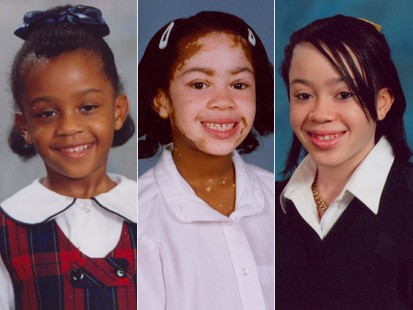|
  |
|
Michael Jackson's Home Movies -2003 grumbit, July 5, 2009 at 1:01:40 PM CESTh
... link Michael Jackson Ghost? During CNN Larry King Interview with Jermaine Jackson grumbit, July 4, 2009 at 7:30:58 PM CESTh
... link Vitiligo and Lupus, The truth about Michael Jackson's skin condition. grumbit, July 4, 2009 at 4:15:00 PM CESTh
When the slanderous attacks became intolerable, in 1993, Michael Jackson revealed, during an Oprah show, that he had a skin disease that turned his skin white. 1994, Michael Jackson’s dermatologist Dr.Arnold Klein testified that MJ was diagnosed with vitiligo and lupus in 1984. Though lupus erythematosus is potentially a lethal disease, luckily it was in remission in Michael. Both discoid lupus erythematosus and vitiligo can produce loss of pigmentation in the skin.
What is Vitiligo? Vitiligo is a common skin disorder that affects 1 in 250 people world over. Half of the cases start between the ages of 10 to 30 years. Genetics plays a role in vitiligo and there is a family history of vitiligo in about 30% of patients, as in the case of Michael Jackson. Vitiligo runs in his family. Vitiligo is considered an autoimmune disease, where the body’s immune cells attack and destroy the coloring pigment melanin in the skin. The onset of vitiligo may be triggered following some trauma to the skin, stress or other illnesses. In some patients, vitiligo is limited to a small area and is stationary for a long time. 30% patients report some spontaneous regression of the white patches over the years. But in most patients, like Michael Jackson, the progress of vitiligo is relentless with white patches continuing to appear despite treatment.
 Vitiligo changed this girls skinkolor in a very short time. Vitiligo is a chronic disease and the response to treatment is variable. Early age of onset of vitiligo, presence of associated autoimmune diseases like thyroiditis or lupus erythematosus, life style diseases like diabetes, uncontrolled stress, black hair turning white and the involvement of lips, fingertips, toe-tips and genitals are predictors of poor prognosis in vitiligo. Is Vitiligo Curable? Vitiligo is not curable, but in a good percentage of patients, it can be treated to arrest the progress of the disease and provide acceptable re-pigmentation. Management of vitiligo involves medical and surgical treatments. Medical treatment of vitiligo consists of phototherapy, topical steroids and immunomodulators. Surgical treatment is available for refractory and stable vitiligo (which remained unchanged for a minimum period of two years). These include punch grafting, epidermal grafting and melanocyte culture and transplantation. Needless to say, these treatments are only feasible when a limited area of skin is afflicted with the leucoderma. Vitiligo and Michael Jackson Vitiligo started spotting Michael Jackson’s skin from his early twenties; he had lupus; and was under constant stress. No wonder then his vitiligo did not respond to treatment and progressed relentlessly. Vitiligo, though a harmless disease, can cause immense stress and heart break in the affected, especially in those with dark skin. Michael Jackson, being a performing artist would have felt his world collapsing around him when the disease started showing up on his face as white spots. Still that did not deter him from churning out record breaking top hits one after another. During the Thriller era Michael would mask the white spots with layers of brown make up that would often trickle down to his costumes and even his microphone. How Michael Jackson Turned White When there were more white patches than his normal skin color and the daily chore of hours of makeup became cumbersome, MJ was given the choice of depigmenting his skin so that the color would even out. The bleaching or depigmentation of the skin was carried out under the supervision of his dermatologist. 20% monobenzylether of hydroquinone was used for this purpose. This chemical causes a permanent and irreversible loss of skin pigment and produces a chalk-white color. The absence of the melanin pigment makes the skin more prone for sun burns, hence Michael Jackson had to wear long sleeves and hat, and, at times, cover his face when he went outdoors.
Michael Jackson's Loss of Skin Color: The Trials and Tribulations The ghostly white color and the plastic surgeries carried out to correct an accident injury (complications of lupus also contributing?) drastically changed Michael Jackson’s features and appearance. This was when the racist slanders flooded against him in the media about how he was forgetting his roots and turning his back on his African ancestry. On February 10, 1993 Michael Jackson revealed on the Oprah show that his skin had turned white due to vitiligo and he had to depigment the skin to even out his skin color. He dismissed the allegations that he had bleached his skin to ‘become white’. “I’m a black American, I am proud to be a black American, I am proud of my race. I am proud of who I am. I have a lot of pride and dignity,” were his words. This did put some brake on the racist attacks on him, but unfortunately there are still many people out there who refuse to accept that Michael Jackson turned white due to the skin disease vitiligo. Vitiligo: A Harmless Skin Disorder with a Social Stigma Vitiligo is not a contagious disease or a serious threat to the general health of an individual. But it still carries a social stigma in many communities. Health education and creating a general awareness should help in ridding the myths surrounding the disease. Michael Jackson was the exemplary example that vitiligo need not be a hindrance to building up a great career that would be remembered for generations to come.
... link Next page |
|
||||
|





